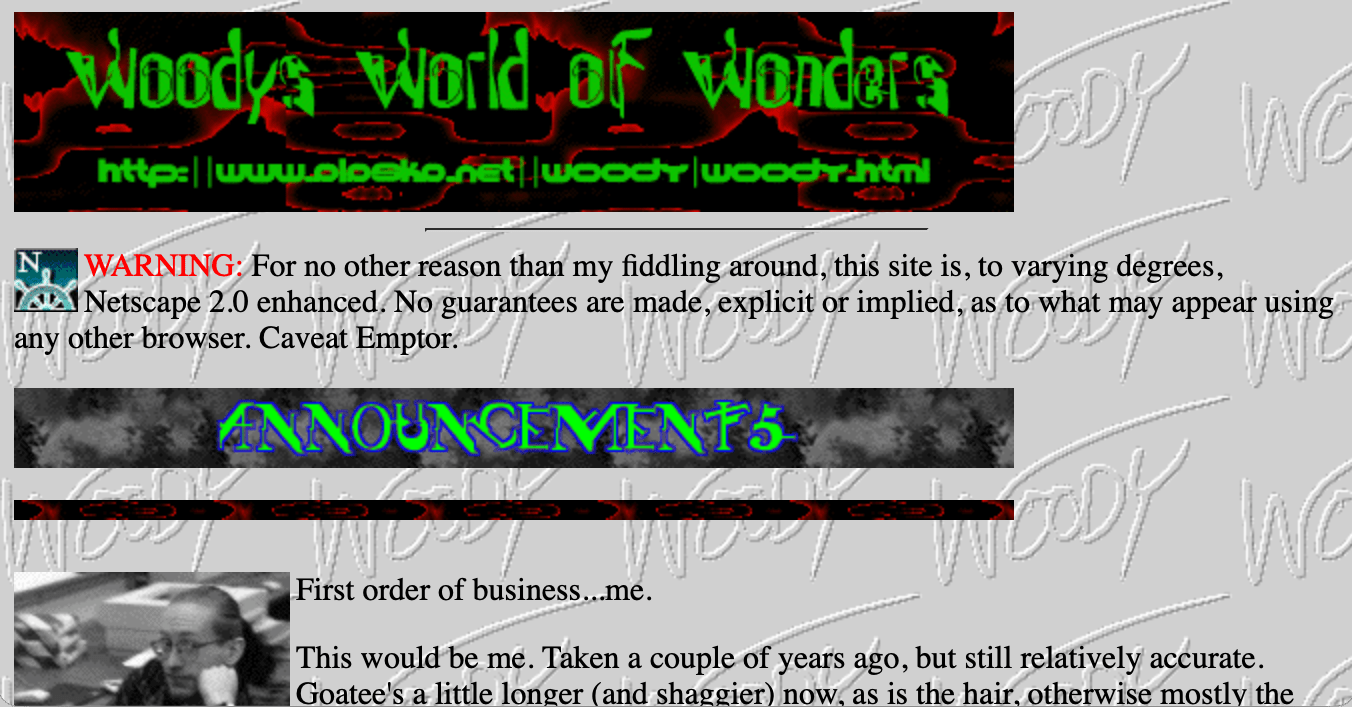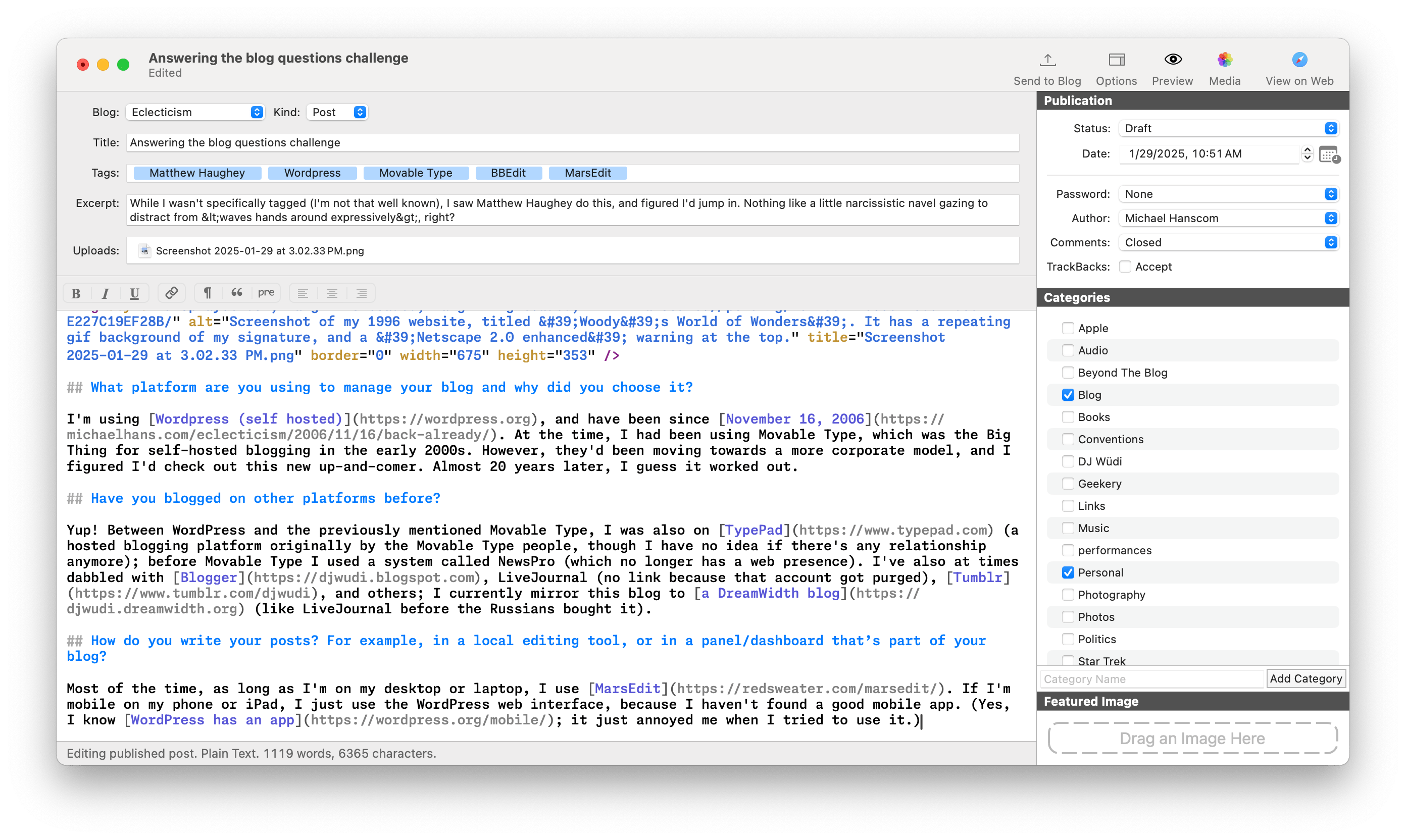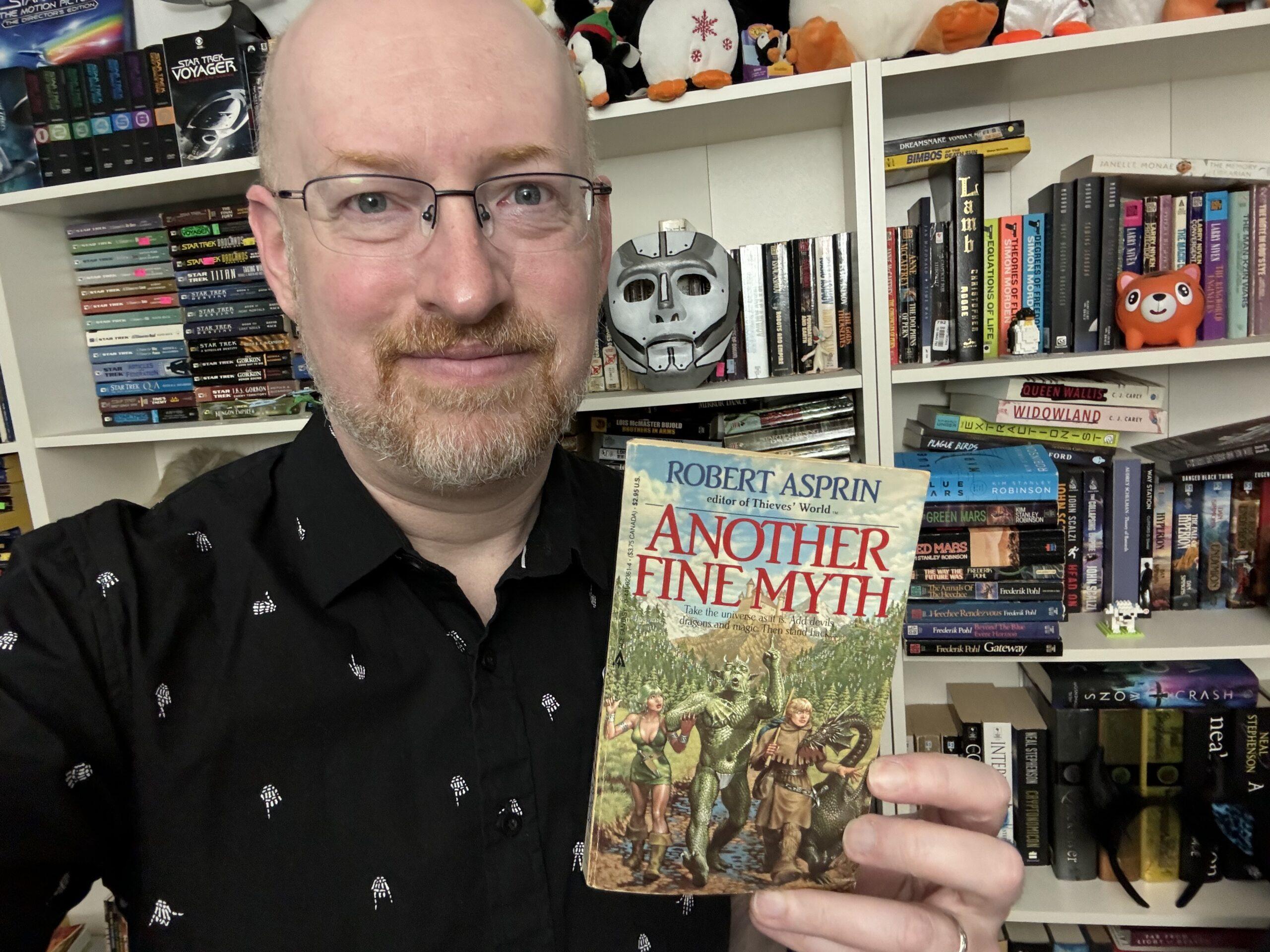With a lot of people (including people I know) talking about leaving Facebook and other Meta properties, but also often expressing frustration with the most popular other options not having the same functionality, I started thinking about what could be done, where, and how. Here are my initial thoughts. This is not a complete or comprehensive list. It may not even be entirely accurate in all respects. There are generalizations in descriptions that may lead to “well, actually…” and “yes, but…” impulses in some readers. I’ll do my best, but corrections, suggestions, and other alternative options are appreciated.
Where are people going?
There’s no simple answer to this, because there is no single alternative site that offers Facebook’s entire feature set. Instead, I’ll look at some of the basic features that people use on Facebook and talking about some of the options for duplicating those features in other places.
Posting things for other people to read
Bluesky
Generally, most people seem to be migrating to Bluesky (I’m on Bluesky). However, Bluesky is much more of a pre-Elon-Musk-Twitter clone than a Facebook clone, so it doesn’t offer the same functionality.
Bluesky, like X/Twitter, lets you post short (300 character) posts that are publicly visible. While you can block other Bluesky users from seeing or interacting with your posts while they are logged in to Bluesky, since every Bluesky post is public, everything you post can still be seen (but not interacted with) by someone who isn’t logged in to Bluesky.
Bluesky is also another single-entity service. While they make a lot of noise about being open and federated, so far that’s nothing but noise, and you’re still moving from one monolithic silo to another monolithic silo (albeit one that’s newer and shinier and that is getting a lot of attention). If (when?) the Powers That Be at Bluesky eventually find themselves swayed by the hundreds of millions of venture capital dollars that are funding them and start doing Questionable Things, well, that’s just the way it goes, and don’t be surprised.
Mastodon
Some people are moving to Mastodon (I’m on Mastodon, and it’s my preferred choice). It’s also essentially a pre-Elon-Musk-Twitter clone, that allows you to post short (usually 500 characters, but this can vary) posts that are publicly visible. It allows you to set your post visibility to public, just people who follow you, or just the people who are mentioned, so it allows for a little more privacy than Bluesky does. However, it does not allow you to set up custom “only show this post to these specific people” lists, which is one of the Facebook features that many people are looking for.
Mastodon is a federated service (these are often referred to collectively as the Fediverse), which is both a strength and a weakness. It’s a strength because it’s not a monolithic silo: There’s no one single Mastodon server, and no single entity in control of all of Mastodon as a whole. If you join a Mastodon server that you find isn’t run in a way you like, you can move to a different Mastodon server (or even a Fediverse-connected server that doesn’t use the Mastodon software) and still interact with everyone you want to interact with. However, this does mean that Mastodon can feel fiddlier and more confusing when new people join: people don’t want to figure out what “joining a server” means, they just want to “join Mastodon”, and this can be and has been a barrier for many.
An imperfect analogy is email: when setting up an email account, you can’t just “join email”; instead, you have to pick which email provider you want to use (Gmail, Yahoo, Microsoft, etc.), and which email provider you use affects your email address, how well spam is handled, how the user interface looks, and so on. Mastodon is similar: you don’t just “join Mastodon”, you join a Mastodon server, which affects your Mastodon address, how well spam and abuse is handled, how the user interface looks (to some extent), and so on. But just as you can send email to any other email user without worrying which email service they use, you can interact with other Mastodon users without worrying about which Mastodon server they use.
Blogs
Blogs are still a thing! You’re reading one right now! And they’re great: You control the content. You can say anything you want. You can make your posts as short or as long as you want. You can post photos or video. You can link to what other people or organizations post. You can allow comments or not. Depending on the blog service or software, you can make your posts public or restrict them with passwords or other access control methods. You can use different themes to change the way your blog looks. Some platforms are more extensible than others. Basically, it’s your space, and it’s up to you to do what you want with it.
And they’re not even difficult! There are a lot of ways how you can set up your own blog. Some are very simple, where you just sign up with a service and start writing; others are for the more technically-minded, where you install software on your own web host.
Some options:
- WordPress is very popular, and is available in two flavors: WordPress.com, where they host your blog and take care of the backend maintenance, or WordPress.org, where you download the software and host it on your own web server. I use the self-hosted version, and it’s served me well for years.
-
Micro.blog is a “sign up and start writing” service. The standard version allows for easy cross-posting to Mastodon, Bluesky, Threads, Tumblr, Nostr, LinkedIn, Medium, Pixelfed, and Flickr, and they just introduced a new, very low cost ($1/month) Micro.one option that connects to the Fediverse. I occasionally consider moving away from WordPress, and if I do, this is the most likely choice for where I’d go.
-
Other options exist as well, though I haven’t used these often or at all, so can’t say much more about them. These include Google’s Blogger, Tumblr, Dreamwidth (remember LiveJournal? Dreamwidth is a LiveJournal clone not owned by Russians), and probably many others.
Posting things for other people to see
Photos
Flickr is one of the largest and most long-lived photo sharing services (I’m on Flickr). You can upload photos, create albums, and share them out from there, allow people to comment and download them or not, and either retain your copyright or set them to use Creative Commons licensing to allow other people to legally reuse or remix them.
Pixelfed is a Fediverse clone of Instagram. As with Instagram, you can upload photos for other people to view and comment on, but as with Mastodon, there’s no one singular “Pixelfed” service. Instead, you pick a Pixelfed server to join, and then you can follow and interact with other Pixelfed users (or any other Fediverse user) without worrying about what server they are on. This has the same strengths and weaknesses as described for Mastodon above.
Video
While both of the above options for photos also support video to some extent, they are primarily focused on still photos. For video, especially longer form videos, the only two major players I’m currently aware of are YouTube and Vimeo. They’re very similar; YouTube, of course, is run by Google and is the metaphorical 800 pound gorilla.
The people behind Pixelfed are working on Loops for short-form videos on the Fediverse, but it’s currently still in very early stages.
Reading things that other people post
Okay, so there are all those options for putting your thoughts out on the wider internet…now how do you keep up with everything that the people you want to keep up with are posting, especially when they’re now scattered over so many different sites and services?
This is one that feels like a big barrier; one of the strengths of monolithic silos like Facebook is that everything is right there, and you don’t have to do anything to find it. It just lands in front of your face as the timeline (or the algorithms behind the timeline) decrees.
The good news? This is actually one of the easiest barriers to surmount. It’s extremely simple to build your own timeline, in chronological order, without mysterious algorithms deciding what you see, and without ads or “suggested posts” popping up in your feed, and you’ll be able to follow along with most virtually (and maybe entirely) all of the sites and services I’ve suggested above.
All you need is an RSS reader.
RSS (short for Really Simple Syndication) is just a specially formatted text file (a “feed”) with the most recent posts someone has posted to their site. By adding RSS feeds to your RSS reader, you see whatever has been posted, all in one convenient place. And the best part is, RSS feeds have been around for years, are a big part of the underlying technology that makes much of the modern internet work, and are provided by nearly every website! Blogs like this one, news sites like CNN, Bluesky, Mastodon, and many, many others.
When you’re on a website that you want to keep up with, just add the website’s main address to your feed reader, and your feed reader should automatically find the RSS feed. If that doesn’t work, many websites will have a link to their RSS feed visible somewhere on the page so you can copy the address directly to add to your feed reader. And that’s it! Whenever you open your RSS reader, you’ll have a nice, simple, clean, chronological list of everything that the sites you follow have published since you last checked in.
You can also add your Bluesky and Mastodon friends to your RSS reader to see what they’ve posted without having to individually check in with Bluesky or Mastodon. I do this because I follow a lot of accounts on both services, and there’s just no way that I’ll be able to read everything that gets posted — but my putting the RSS feeds for my most important accounts (generally, friends I know in the real world) into my feed reader, I know that I’ll see their posts, even if I don’t happen to see it when I’m on Bluesky or Mastodon.
As an Apple user, my preferred and highly recommended RSS reader is NetNewsWire, which is available for the desktop/laptop, for iPhones, and for iPads. I’m afraid I don’t have my own recommendations for native Windows or Android readers, but I’m happy to add recommendations here if I get any suggestions.
There are also several web-based RSS readers so that you’re not dependent on an app on your computer or mobile device, and many of these can be accessed by on-device RSS reader apps. I use Feedbin and have it connected to NetNewsWire, which allows me to use NetNewsWire on my computers and mobile devices, log into the Feedbin website if I’m on another device, or even experiment with different RSS reader apps, and always have my reading list up to date.
This often seems like the most complicated part of keeping up with everyone you want to keep up with, but with RSS, it’s actually the easiest part of this whole thing.
Events
Unfortunately, this is an area that I don’t currently have any pointers for. I’m open to suggestions from others, though!
Private groups
This is another area where I don’t currently have good pointers. Discussion board and forums used to be really good at this sort of thing before Facebook and social media in general virtually killed them off. I know they’re still out there and being used, they’re just not as prevalent as they used to be, because Facebook offered everything in one single place. Once again, I’m open to suggestions!
Personally, I think a resurrection of private discussion boards and forums would be a great way to go, but I haven’t looked yet to check into the current state of things in this arena.
But what about Discord? Or Slack?
Though I use both, I’m not a big fan of Discord or Slack, because, like Facebook, they are monolithic silos. They don’t feel like it, because you’re logging into this Discord server or that Slack server, but they’re still all controlled by their parent entity. (Much like Facebook groups are seemingly private spaces within Facebook, every Discord or Slack is just a seemingly private space run by Discord or Slack).
They’re also quirky, often confusing for new users, and very difficult to search through. To me, they’ve managed to combine all the worst features of social media, chat, and discussion forums, making them a kludgy mess rather than a convenient solution. Your mileage may vary (YMMV), of course.
Final thoughts
The best thing about Facebook was that everyone was in one place, there were some pretty impressive granular control over who could see what you posted, events could be promoted and shared, groups could be built, and you didn’t need to go anywhere else to do it, and it was “free” (in scare quotes, since it was free because we were the products being sold, not the customers).
The worst thing about Facebook…well, there’s no single “worst thing”, but if you’re seriously considering getting away, you’re likely already quite familiar with all the smaller individual “worst things” that add up to it becoming an ever-worsening trash heap surfacing and promoting the worst impulses of humanity.
Moving away is possible! Because there is no one single place to move to that offers all of Facebook’s features (in my opinion, this is a good thing, as anytime there’s “one single place” for everything, the chances of that place eventually falling over and turning into what Facebook has turned into steadily increases with time), a little bit of work in learning new things will be necessary. But much of it is already out there and not that difficult to figure out. And the figuring out is worth doing.







